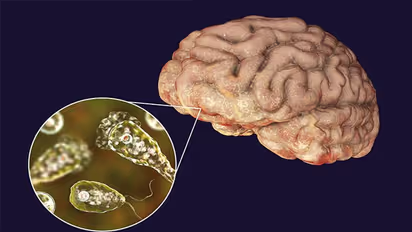What is Brain-eating amoeba? Know its symptoms, prevention and chances of survival

Synopsis
A 15-year-old boy in Kerala’s Alappuzha district has passed away due to a rare infection caused by Naegleria fowleri or “brain-eating amoeba”. It was said he was suffering for a week of high fever and rapid deterioration in his vitals.
A 15-year-old kid died in Kerala's Alappuzha district on Friday due to the uncommon brain infection 'primary amoebic meningoencephalitis' (PAM), according to news agency PTI, quoting state health minister Veena George. "It's a rare condition, and only one in ten thousand people will be affected by it." The health agency has taken necessary precautions to clean up the location where the sickness was discovered. Previously, just five people in the state had the illness," she added in an official message.
Meanwhile, local health authorities have recommended that residents refrain from bathing in polluted water to limit the spread of the sickness.
What is Brain-eating amoeba?
Scientifically known as Naegleria fowleri, is a microscopic organism that can cause a rare but severe brain infection called primary amebic meningoencephalitis (PAM). Naegleria fowleri is typically found in warm freshwater environments such as lakes, hot springs, and poorly maintained swimming pools. Infections occur when contaminated water enters the body through the nose, allowing the amoeba to travel to the brain. Once in the brain, the amoeba causes inflammation and destruction of brain tissue, leading to severe neurological symptoms and, in most cases, death. It is important to note that infections caused by brain-eating amoeba are extremely rare but can be fatal.
Also Read: Protecting your skin during Monsoon: 6 vital Skincare tips for Diabetics
How does it spread?
According to the government press release, PAM is caused by a free-living amoeba that lives in contaminated waters and enters the body through the nasal passage, typically while swimming or diving in contaminated water, and affects the brain and central nervous system.
Symptoms:
Fever, headache, vomiting, and seizures are the most common symptoms of the condition. "All of the infected patients had died," the minister stated, adding that the unusual brain ailment had a 100% death rate.
Prevention:
PAM treatment choices are limited, thus early intervention is critical for the greatest odds of survival. To combat the infection, antifungal drugs are usually used. However, prevention is essential for lowering the chance of illness. Swimming or diving in warm freshwater bodies is not advised. It is best to utilise nose clamps or keep your head above water when participating in aquatic activities.
Also Read: Immunity to Digestion: 5 incredible advantages of drinking Ginger Tea in Monsoons
Chances of survival?
A brain-eating amoeba may be devastating, with a 97% mortality rate. Unfortunately, the odds of surviving this illness are slim. Inflammation and neurological symptoms such as severe headache, fever, nausea, vomiting, stiff neck, convulsions, and coma are caused by the infection's fast destruction of brain tissue. Despite the finest medical measures, such as antifungal drugs and supportive care, the chances of surviving a Naegleria fowleri infection are extremely low. Early detection and treatment are critical, but the prognosis remains bleak.
Explore the latest Lifestyle News covering fashion, wellness, travel, Food and Recipes, and more. Stay updated with trending Health News, fitness tips, and expert insights to inspire your daily living. Discover personalized lifestyle trends that keep you stylish and informed. Download the Asianet News Official App from the Android Play Store and iPhone App Store for everything that adds value to your everyday life.